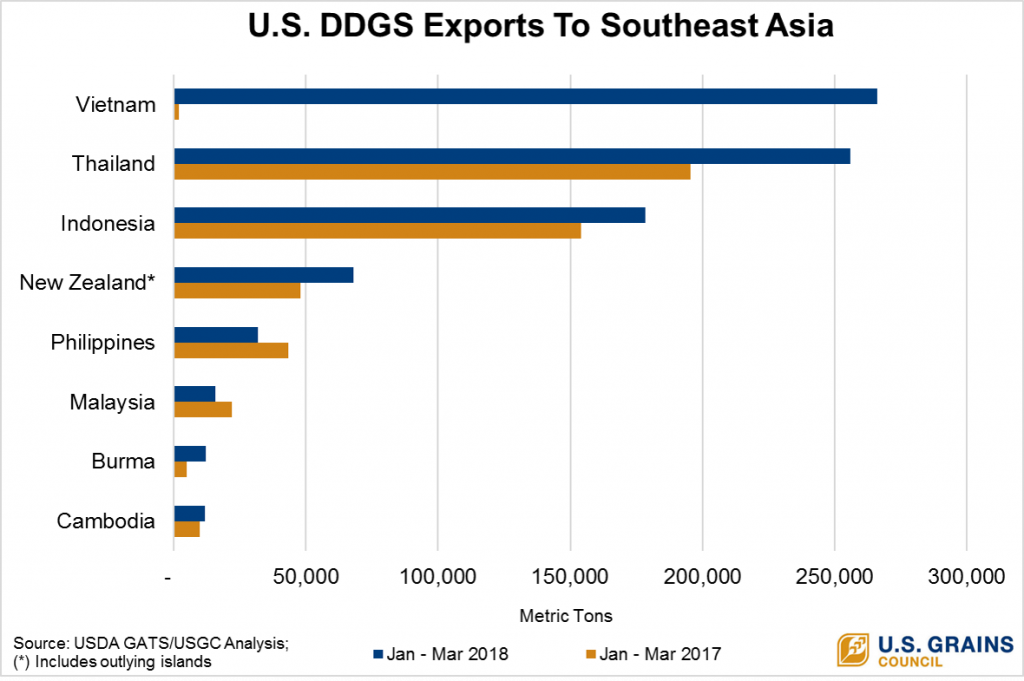Promotion and market development for U.S. distiller’s dried grains with solubes (DDGS) has been a mainstay of the U.S. Grains Council’s (USGC’s) work for many years. The United States exports approximately 11 million metric tons of DDGS annually for use in livestock feed. Three years ago, China consumed roughly 50 percent of all U.S. DDGS exports; however, after the Chinese government started erecting barriers to DDGS imports in 2016, China accounted for only three percent of U.S. DDGS exports by 2017.
Despite the drop in the top market, total exports of U.S. DDGS have remained steady. The key to this success is the U.S. industry’s ability to diversify export markets. The Council is working aggressively in partnership with the U.S. industry to make this happen through programs designed to provide nutritional information to producers in growing livestock sectors across the globe.
Monitoring demand potential in Southeast Asia
The Southeast Asia market for DDGS remains strong and continues to grow. The Council’s efforts to overcome market disruptions in Vietnam has largely been successful. The Council has also continued to support the expansion of DDGS sales in the region by providing technical expertise and support as well as connecting grain buyers and end-users with U.S. suppliers. Programs in Vietnam are targeting aquaculture and swine programs, whereas activities in Indonesia and Malaysia focus on broiler and layer sectors. In the Philippines, the Council is providing information on DDGS storage and handling.
Thailand was the fourth largest buyer of U.S. DDGS in the 2016/2017 marketing year, purchasing 791,000 tons. Already in the new marketing year (September 2017 to March 2018), Thailand has purchased 547,000 tons, bolstered by the Council’s trade servicing and technical assistance to the country’s feed manufacturers for swine, broilers and layers sectors, among the largest in the world.
Indonesia has also steadily increased imports of U.S. DDGS over the three marketing years, importing about 512,000 tons in 2016/2017. Indonesia has already purchased 503,000 tons in the current marketing year, a 90 percent increase year-over-year that makes the country the fifth largest world buyer.
Technical education, trade policy key to Middle East expansion
Imports of U.S. DDGS to the Middle East are also surging, a significant payoff for the Council’s marketing programs in countries like Turkey. The Council remains active in the country through assessment missions, engaging the country’s six major feed grain importing companies and organizing regional seminars on quality to build confidence, take advantage of marketing opportunities and connect end-users with U.S. suppliers.
As a result, Turkey was the second largest buyer of U.S. DDGS in the 2016/2017 marketing year with 1.36 million tons of imports, nearly double the total from the prior marketing year. Turkey is currently the sixth largest market in the new marketing year with 495,000 tons in DDGS purchases.
Optimistic market potential continues in 2017/2018
Market potential for DDGS exports across the globe remains optimistic in the 2017/2018 marketing year. In combination with of one of the lowest per unit of protein cost compared to other feed ingredients, the Council’s work is helping end-users determine how best to incorporate U.S. DDGS into their rations. As a result, the Council is confident world demand for U.S. DDGS will continue to grow.
Editor’s note: A version of this article appeared in Feed & Grain magazine’s Global Connection section and is condensed here in Global Update. Find the full version of the article here.
About The U.S. Grains Council
The U.S. Grains Council develops export markets for U.S. barley, corn, sorghum and related products including distiller’s dried grains with solubles (DDGS) and ethanol. With full-time presence in 28 locations, the Council operates programs in more than 50 countries and the European Union. The Council believes exports are vital to global economic development and to U.S. agriculture’s profitability. Detailed information about the Council and its programs is online at www.grains.org.

